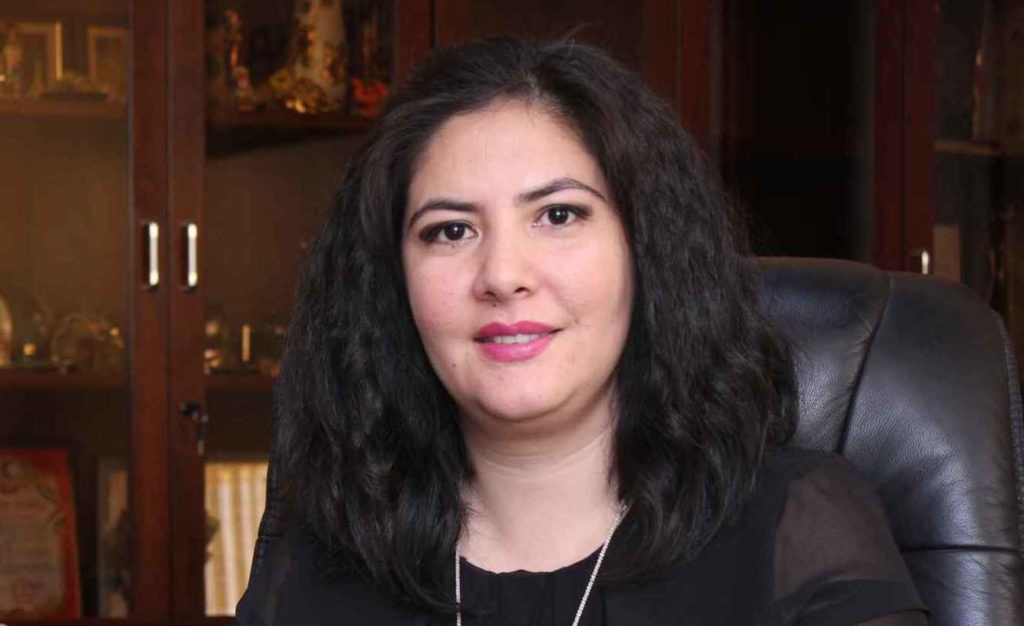Age: 43
Origin: Khujand, Tajikistan
Based in: Dushanbe, Tajikistan
Education:
- Khujand Branch of the Technological University of Tajikistan – Economics and management in light industry
- University of Minnesota USA – Business Administration
- Moscow Business School – Master of Business Administration
Occupation: Chair of the Bank – Arvand
As the only woman in Tajikistan who runs a bank, Sodiqova’s story inspires many young Tajik women to become entrepreneurs and start their own businesses.
Between 1996-97 Sodiqova participated in the U.S.-financed programme ‘Youth for Understanding’ which allowed her to study business at the University of Minnesota. Her time in the United States broadened her outlook, made her more independent, increased her ability to make her own decisions, improve her English and showed how business worked in a developed country. She then came to a turning point in her life where she had to choose, according to the phrase, whether to be a big fish in a small pond in Tajikistan or stay in the U.S. as a small fish in a big pond. Sodiqova chose to return to Tajikistan and become the big fish.
In 2002 Sodiqova became the head of the Centre for Development and Support of Microentrepreneurs (MDTM), which was founded by the American NGO ACDI/VOCA. While working with microentrepreneurs, Sodiqova knew that starting a microfinancing institution was essential but would be difficult to undertake in a country still recovering from a brutal civil war as “Tajiks lost their trust in the financial sector, as many of them lost their savings in the 1990s.” Sodiqova’s primary goal with MDTM was to help women get access to finance, 80 percent of her clients were female, mostly microentrepreneurs who were of no interest to the big banks.
Microfinancing became a crucial tool for the rebuilding of Tajikistan’s economy, the Tajik government recognised this and in 2004 passed a law that provided a legal framework for offering and developing microfinance activities. The adoption of this law allowed MDTM to register as a micro-lending fund and in 2005 it renamed itself MicroInvest.
As around 30 percent of Tajikistan’s nine million citizens survive on less than five dollars a day Sodiqova stresses that “access to funding is essential for these people”, and that microfinance “enables them to start a business and strengthen their financial position”. Her customers range from local farmers who want to buy more livestock to women selling textiles who are looking to expand their inventories. As Tajikistan’s economy is 95 percent cash-based, Sodiqova found it challenging to give out loans as her potential customers commonly didn’t have any financial documents or bank statements, so she had no insight into their financial situation. “We do of course ask them a lot of questions and visit their businesses or homes. But what it ultimately comes down to is trust,” says Sodiqova.
Sodiqova has also spent a lot of time and effort on educating her customers in financial literacy. “We explain to them how we operate, when is the best time to take out a loan and how we gear the size of their loan to their repayment capacity. This allows both us and the customer to keep an eye on the financial risks and enables us to establish a relationship based on trust.” Sodiqova designs her bank services in a way that is easy for women to use. She is inspired by her female customers: one woman, a butcher, the only female in her profession, began with a $100 loan and ended with a $20,000 loan.
In October 2008, MicroInvest developed into the Limited Liability Microcredit deposit organisation “Arvand”. In 2010, Arvand reported total assets of $11.5 million and in September 2019 Arvand and credit organisation CJSC “AccessBank Tajikistan” merged into the CJSC Bank Arvand.
On September 30, 2019, the official presentation of Arvand’s banking licence was given to Sodiqova by the Chairman of the National Bank of Tajikistan, Jamshed Nurmahmadzoda. This was a momentous occasion for both Sodiqova and women all over Tajikistan as she became the first woman in the country to chair a bank. Just a few weeks later, Sodiqova’s achievement was recognised when she was asked to speak at the G5 Start-up Forum, organised by the Tajik government and attended by 720 entrepreneurs and young people keen to hear from successful Tajik entrepreneurs, such as Sodiqova.
The newly-formed bank received a loan of $2.5 million from the International Finance Corporation (IFC), a member of the World Bank Group. Arvand offers loans, deposits, current accounts, remittances, currency exchange, and a number of non-financial services. By the end of the second quarter in 2019, Arvand had 42,000 active loan clients, of which 72 percent were from rural areas.
The pandemic was tough on Sodiqova and Arvand Bank, but thankfully she was helped in April 2021 with a financial package of $4 million organised by the European Bank for Reconstruction and Development. Arvand Bank is now the 3rd largest microfinancing bank in Tajikistan and is serving almost 100,000 clients through 72 branches across the Central Asian country, including in the Gorno-Badakhshan Autonomous Region, a mountainous area, which occupies almost half of the country’s territory and where the presence of financial institutions is limited.
Award: In 2014 Arvand was officially awarded the Centre for Financial Inclusion certificate “SMART Campaign” and became the 17th company in the world, the first and only company in Tajikistan, which fully complies with and fulfils seven client protection principles, 30 standards and 95 indicators.
Quote: “Women are naturally predisposed to coordinate, manage, and take control.”

